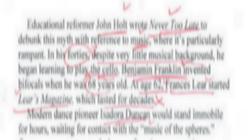Perhaps you've heard the
story of the guy whose arm got pinned
between two rocks while he was climbing
alone in Canyonlands National Park. Having
told no one where he was going, he knew no
one was going to show up to rescue him. To
save his life, he cut off his own arm with a
small, dirty pocket knife.
Although this young man
portrays himself as a hero, some experienced
climbers and hikers roll their eyes at the
story, because it's a basic tenet of
outdoorsmanship not to climb or hike alone
and to leave word with a friend or park
ranger where you're going and when you
expect to return.
Whether you admire the
fellow in question as courageous or look
down on him as an impetuous fool, it's
important to note that his hero story
doesn't necessarily go over the way he
intends. People can take in the same facts
and draw an opposite conclusion.
If you're trying to sell
books, that duality simply makes your
narration more controversial and
attention-getting. However, if you've shaped
your business bio around a hero story, be
aware that it can kick dust into your
background and generate negative opinions
that wouldn't have come up with a less
dramatic presentation.
Whereas a hero story line
carries risk, that multiplies when the bio
revolves around having been a victim of hard
luck, then triumphing. For example, you may
believe that you were forced into
bankruptcy, and you build your story around
having bounced back from that calamity.
However, many people believe that only
irresponsible people go bankrupt. Indeed, in
a 2005 study in the U.K., more than 70
percent of the general public agreed that
there is a stigma attached to bankruptcy -
that is, that people look down on those who
have gone bankrupt.
While you were hoping to
impress people that you recovered valiantly
from bankruptcy, they may be wondering more
about the bad financial decisions you might
have made than admiring you for the
recovery. By revealing the bankruptcy as
part of a victim story, you may be tainting
your image more than helping it.
Negative judgments are
common about events in other hard luck
stories, too. For instance, your spouse left
you; you were cheated out of your
inheritance; you were discriminated against;
you lost your children in a custody fight;
you had a vindictive boss; a careless doctor
or hospital made you ill - for all these
situations, readers or listeners can easily
and sometimes automatically turn the story
upside down with the belief that you must
have had a hand in your own misfortune. They
imagine the other side of the story. Spouses
leave when there is a breakdown of trust,
which involves both parties; parents
disinherit ungrateful or wayward children;
discrimination is often a fabricated
accusation; mothers don't lose custody of
their children unless they've done something
horrible; and so on.
|
Advice on "Help - They
Just Don't Get It!"
One of the most unnerving and
perplexing marketing dilemmas is having customers who do not believe
they need what to your eyes they
desperately lack. In a three-audio set,
learn the six most common reasons for
such a misfire and the six best remedies
that lead to understanding. Then
listen to two coaching calls in which
Marcia Yudkin helps a client and
listeners understand how to apply this
sort of diagnosis and treatment to
actual misunderstandings between service
providers and potential customers.
Three one-hour recordings, $79.95.
ORDER
NOW. |
I'm certainly not saying
bad things can't happen that are out of your
control, that you are responsible for any
terrible event that happens to you or that
you should never tell people you triumphed
over adversity. Rather, realize that you may
be so invested in how you tell your story
that you believe it's the only way to view
the facts. You may be blind to the way
you're unwittingly painting a negative
rather than a positive picture of your
character and background to some potential
clients and supporters.
Is it worth taking that
risk? You may decide it is. That's fine - as
long as it's a conscious decision.
Copyright 2010 Marcia Yudkin. All rights reserved.






